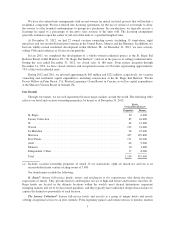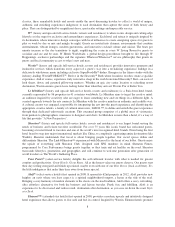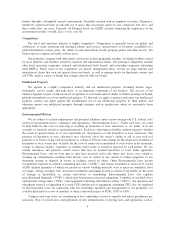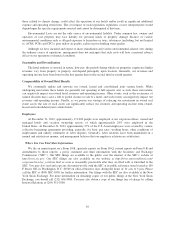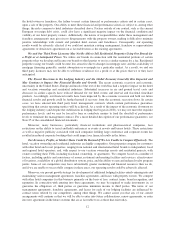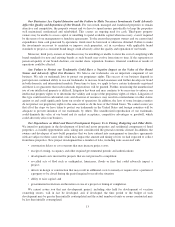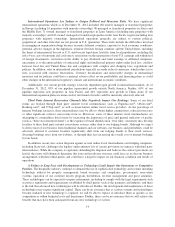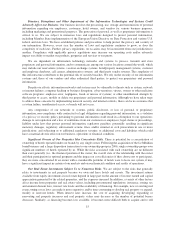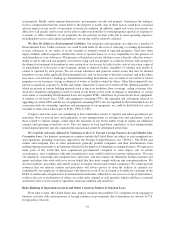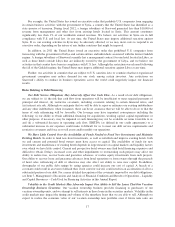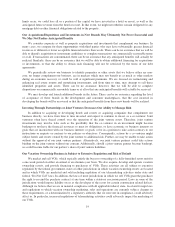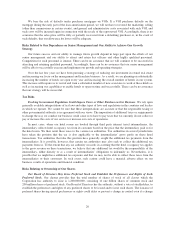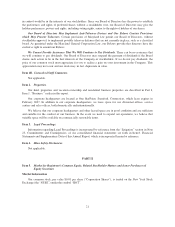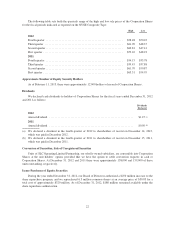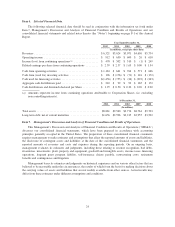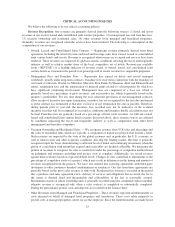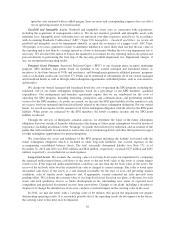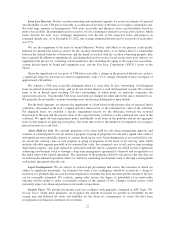Starwood 2012 Annual Report Download - page 116
Download and view the complete annual report
Please find page 116 of the 2012 Starwood annual report below. You can navigate through the pages in the report by either clicking on the pages listed below, or by using the keyword search tool below to find specific information within the annual report.For example, the United States has issued an executive order that prohibits U.S. companies from engaging
in certain business activities with the government of Syria, a country that the United States has identified as a
state sponsor of terrorism. During fiscal 2012, a foreign subsidiary of Starwood generated less than $10,000 of
revenue from management and other fees from existing hotels located in Syria. This amount constitutes
significantly less than 1% of our worldwide annual revenues. We believe our activities in Syria are in full
compliance with U.S. and local law. At any time, the United States may impose additional sanctions against
Syria. If so, our existing activities in Syria may be adversely affected, or we may incur costs to respond to an
executive order, depending on the nature of any further sanctions that might be imposed.
In addition, in 2011 the United States issued an executive order that prohibited U.S. companies from
transacting with the government of Libya and certain entities and individuals associated with the former Gaddafi
regime. A foreign subsidiary of Starwood currently has a management contract for one hotel located in Libya, as
well as three hotels outside Libya that are indirectly owned by the government of Libya, and we believe our
activities in that country have been in compliance with U.S. law. Although the restriction was released following
the fall of the Gaddafi regime, the United States may impose additional sanctions against Libya at any time.
Further, our activities in countries that are subject to U.S. sanction laws or countries that have experienced
government corruption may reduce demand for our stock among certain investors. Any restrictions on
Starwood’s ability to conduct its business operations across the world could negatively impact our financial
results.
Risks Relating to Debt Financing
Our Debt Service Obligations May Adversely Affect Our Cash Flow. As a result of our debt obligations,
we are subject to: (i) the risk that cash flow from operations will be insufficient to meet required payments of
principal and interest, (ii) restrictive covenants, including covenants relating to certain financial ratios, and
(iii) interest rate risk. Although we anticipate that we will be able to repay or refinance our existing indebtedness
and any other indebtedness when it matures, there can be no assurance that we will be able to do so or that the
terms of such refinancing will be favorable. Our leverage may have important consequences including the
following: (i) our ability to obtain additional financing for acquisitions, working capital, capital expenditures or
other purposes, if necessary, may be impaired or such financing may not be available on terms favorable to us
and (ii) a substantial decrease in operating cash flow, EBITDA (as defined in our credit agreements) or a
substantial increase in our expenses could make it difficult for us to meet our debt service requirements and
restrictive covenants and force us to sell assets and/or modify our operations.
We Have Little Control Over the Availability of Funds Needed to Fund New Investments and Maintain
Existing Hotels. In order to fund new hotel investments, as well as refurbish and improve existing hotels, both
we and current and potential hotel owners must have access to capital. The availability of funds for new
investments and maintenance of existing hotels depends in large measure on capital markets and liquidity factors
over which we have little control. Current and prospective hotel owners may find hotel financing expensive and
difficult to obtain. Delays, increased costs and other impediments to restructuring such projects may affect our
ability to realize fees, recover loans and guarantee advances, or realize equity investments from such projects.
Our ability to recover loans and guarantee advances from hotel operations or from owners through the proceeds
of hotel sales, refinancing of debt or otherwise may also affect our ability to raise new capital. In addition,
downgrades of our public debt ratings by rating agencies could increase our cost of capital. A breach of a
covenant could result in an event of default that, if not cured or waived, could result in an acceleration of all or a
substantial portion of our debt. For a more detailed description of the covenants imposed by our debt obligations,
see Item 7, Management’s Discussion and Analysis of Financial Condition and Results of Operations – Liquidity
and Capital Resources – Cash Used for Financing Activities in this Annual Report.
Volatility in the Credit Markets May Adversely Impact Our Ability to Sell the Loans That Our Vacation
Ownership Business Generates. Our vacation ownership business provides financing to purchasers of our
vacation ownership units, and we attempt to sell interests in those loans in the securities markets. Volatility in the
credit markets may impact the timing and volume of the timeshare loans that we are able to sell. Although we
expect to realize the economic value of our vacation ownership note portfolio even if future note sales are
17


